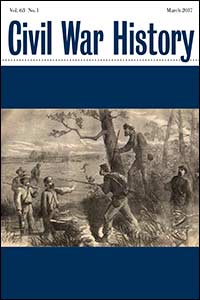March 2017, Volume 63, No. 1
Dec 6th, 2016by: Adam H. Petty
This article analyzes the interaction between the environment and the contending generals, armies, and soldiers during the Mine Run campaign. Conducted from November 26–December 2, 1863 the Mine Run campaign produced few casualties and fewer results and as a result historians have neglected the campaign. An environmental analysis reveals an intriguing case study of how the environment can influence strategy and act upon armies and individuals, even as armies and individuals act upon the environment. This analysis also demonstrates Mine Run’s importance as a model for the subsequent Wilderness campaign and as a precedent for an army’s ability to literally remake its surroundings through the use of field fortifications—a practice which would become standard in the Overland campaign.
“Whenever the Yankees were Gone, I was a Confederate”: Loyalty and Dissent in Civil War-Era Rapides Parish, Louisiana
by: David T. Ballantyne
During the Union army’s brief 1864 Red River campaign, over 1200 free residents from central Louisiana parishes swore oaths of future loyalty to the Union in Alexandria. This article examines wartime and post-war civilian loyalties in central Louisiana, especially Rapides Parish. It makes substantial contributions to scholarly debates over Confederate nationalism, and the inability of the post-war Republican Party to attract white support in the South. While there were some sincere Unionists in central Louisiana, most civilians took the Union oath pragmatically, to protect their property or for commercial gain, and returned their lukewarm loyalties to the Confederacy when Union troops left. Ironically, the Red River campaign weakened the position of local Unionists, and incubated guerrilla conflicts that made post-war reconciliation increasingly unfeasible.
Adam H. Petty is a doctoral student in history at the University of Alabama at Tuscaloosa. He also serves as the managing editor of the journal Southern Historian.
Book Reviews:
Bledsoe, Andrew S. Citizen-Officers: The Union and Confederate Volunteer Junior Officer Corps in the American Civil War. Reviewed by Lorien Foote.
Slap, Andrew W. and Frank Towers, eds. Confederate Cities: The Urban South during the Civil War. Reviewed by Peter A. Coclanis.
Brooks, Corey M. Liberty Power: Antislavery Third Parties and the Transformation of American Politics. Reviewed by Lisa M. F. Andersen.
Samito, Christian G. Lincoln and the Thirteenth Amendment. Reviewed by Daniel W. Crofts.
Efford, Alison Clark. German Immigrants, Race, and Citizenship in the Civil War Era. Reviewed by William B. Kurtz.
Anderson, Kristen Layne. Abolitionizing Missouri: German Immigrants and Racial Ideology in Nineteenth Century America. Reviewed by Steven Rowan.
Kurtz, William B. Excommunication from the Union: How the Civil War Created a Separate Catholic America. Reviewed by Ian Delahanty.
Dollar, Kent T. Larry H. Whiteaker, and W. Calvin Dickinson, eds. Border Wars: The Civil War in Tennessee and Kentucky. Reviewed by Elle Harvell.
Doyle, Don H. The Cause of All Nations: An International History of the Civil War. Reviewed by Patrick J. Kelly.


